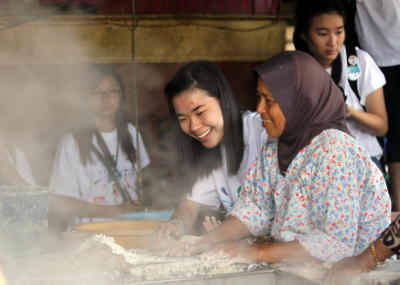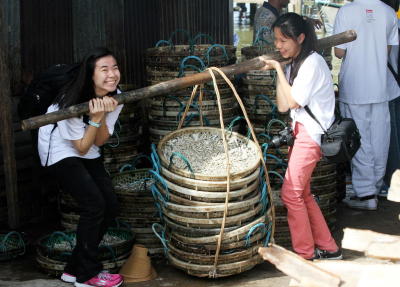WHEN you ask most of the locals in Kuala Terengganu about Seberang Takir, they’ll most likely say think of two words – keropok lekor.
True enough, when we arrived at the small kampung after taking a short boat ride, the first thing we saw were a few keropok lekor shops, all boiling the fresh fish paste using wood-fire.
While it was indeed an interesting sight watching the old ladies in the shops rolling the fish paste together, some of the BRATs managed to find an even more interesting story in traditional bladesmith Ibrahim Mohammad.
At an age when most children are usually playing with toy swords, Ibrahim was already surrounded by the real deal. Growing up in a family of bladesmiths, he had all sorts of knives and swords around him.
The family makes everything from sickles for the local farmers to traditional weaponry.
His father had taught him from an early age everything he needed to know to be a bladesmith, just as he learned from his own father, who is still in the business now.
Ibrahim still does everything the traditional way, even though using machines would make things a lot easier. “But a sword made by hand will always be stronger,” he said.
For Ibrahim, producing a good blade is an art, one which he always pours his heart and soul into.
“The blades we create are different from ordinary blades. Our work really captures the fine art of traditional weaponry,” he said.
Fishy business
While the keropok lekor businesses in Seberang Takir continue to flourish, being widely sold across the river at Kuala Terengganu’s famous Pasar Payang, other traditional businesses haven’t fared so well.
“Back in the days, there used to be many other small shops selling ikan bilis kering (dried anchovies), but eventually most of them died off,” said W. Sabil, 61, who started his anchovies business from scratch three years ago.
Initially a keropok lekor seller, he decided to venture into this business, hoping to sustain this small industry in his village.
He explained that the decline is happening because the younger generation are showing lack of interest in succeeding their parent’s business, especially those in the ikan bilis business.
“I had to raise enough capital myself,” recalls Sabil, who was born and bred in Seberang Takir.
His face saddened when the talk about his children came up. He feels heartbroken as none of his children want to take after his business.
As he single-handedly started this business, he will be sad to see all of his efforts go to waste. And with no successors in line, this remains a burning concern for him.
Until then, he plans to continue with his business for as long as he can.
Sabil rises early every morning to steam the anchovies collected from fishermen over a big fire. He and his few workers will then shift the trays of steamed ikan bilis and spread them over several nets under the sun to dry for about a day, depending on the weather.
Whenever it rains, Sabil will have no choice but to store the ikan bilis in a storage room until the rain stops.
Despite the hardship and his old age, he is passionate about his job even though it means long hours of toiling.
“I like working in the village very much,” he said happily, and his enthusiasm was palpable when he shared about his job.



Tell us what you think!